Ukraine war: 'If this is true, then I am also a Nazi'
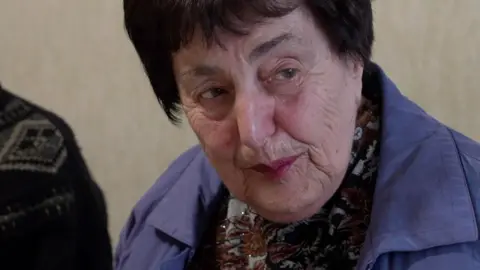 BBC
BBCThe last time war came to Uman, the city was occupied by the Nazis.
Now 83, Olga was only two years old when the soldiers arrived in her village.
We are sitting around a table in a Jewish community centre in Uman, a city slightly west of the centre of Ukraine. The walls of the centre are covered in smiling photos of family gatherings and a box of matzah stapled to a display of a shabbat meal.
Olga watches the tea in her cup gradually turn a bitter dark brown. She doesn't touch the biscuits on the table. She lives just a few miles from where she was brought up.
"We were taken 5km [three miles] to a field. I was with my mum and my grannie," she tells us. "When we came to the field ditches were already dug. They began to shoot. We were surrounded by the dogs, by policemen, to stop anyone from running away.
"People started to fall into the ditch. Alive, dead, wounded. They started in the morning and it went on until midday. Then they sprinkled a little earth and left.
"Two boys, aged six and seven, survived. They started to look for other survivors. They dug me out with their hands."
Olga survived, kept hidden by a family until the war ended.
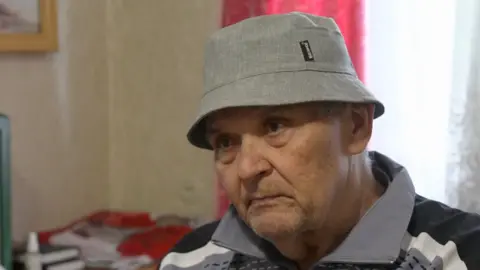
She's one of three Holocaust survivors at the table. The other stories are similarly shocking. Dmytro's family lived in a forest to escape the Nazis. Yevhen remembers narrowly escaping from a basement when Nazi soldiers attempted to gas him with exhaust fumes. Only his mother and he survived the war.
Russian President Vladimir Putin's repeated accusations that Ukraine needs to be de-Nazified feel particularly insulting to a group that lived through the occupation.
"I have many relatives in Russia. They start telling me that we have a lot of Nazis," says Dmytro. "I tell them, if this is true, then I am also a Nazi. You can kill me too."
"Putin has no business here," says Olga. "The way he mocks peaceful people is simply unimaginable."
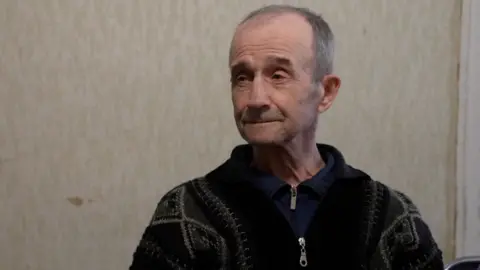
Now in their 80s, they find their home city facing a new threat.
The city of Uman is well known as a place of pilgrimage for Orthodox Jews visiting the grave of Rabbi Nachman, the founder of Breslov Hasidic movement. Every year, during the holiday of Rosh Hashanah, thousands of worshipers arrive in the city.
For now, the streets close to the grave are quiet. Posters in Hebrew, advertising PCR tests, blow gently in the breeze. We are told that of around 2,000 Breslov Jews that live in the city year round, only between 50 and 100 have stayed. Uman was hit by a missile in the first days of the war, killing a cyclist. It was enough for many to decide to leave.
Uman is less than 160km from the Moldovan border. With roads leading from Dnipro in the east, Odesa in the south and Kyiv in the north, many evacuees passed through the city as they fled their country. Some of the Jewish community that stayed behind began to help.
"We decide to give them a place to sleep, the hotel and the medical centre," says Rabbi Nathan Ben Nun, president of the Rabbi Nachman foundation. "War is not good, but we must make lemonade from lemons you know?"
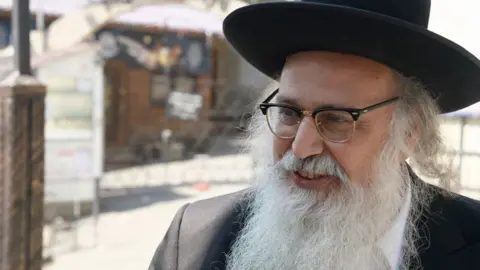
One of the largest synagogues in Europe, the Breslov Hasidic synagogue can hold thousands of worshippers across its three floors. Usually only full during Rosh Hashanah, now this cavernous space is used as a welcome centre, open to all regardless of religion as a first port of call when they arrive in the city. The space is used for clothing donations - piles of jumpers, woolly hats and T-shirts are spread out over its pews - and volunteers cook meals for anyone who needs it. The synagogue's basement, usually used for ceremonial washing - Mikveh - is now a bunker. Mattresses are piled up on the wooden changing benches.
"We've had up to 200 people staying here," says Irina Rybnitskaya, lawyer at the Rabbi Nachman foundation who has helped organise the response at the synagogue. "Some sleeping all night. On the first day of the war everyone was afraid. No one knew what to do. A lot of people came to us, so we were hosting them with tea and coffee."
"The Hasidic community and Ukrainians became much closer. They don't differentiate between Jewish people or not Jewish. It doesn't matter."
Many evacuees left in a hurry with few possessions, money or idea of where they would go. In some of the city's concrete block hotels, usually packed only once a year by pilgrims, families have been found rooms, paid for by Jewish foundations.
In one hotel, housing over 100 families, all now reliant on the kindness of strangers, we meet the seven members of the Yeremets family. They escaped from the Russian-occupied city of Kherson around two weeks ago. Piled up in the corner of their hotel room are three tool boxes.
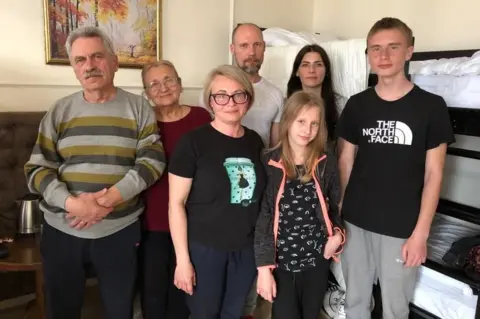
"I work in IT, but I can make furniture too," said one family member, Dmytro. "I thought perhaps wherever we end up, it might be useful."
They were planning to sleep in their car when they stumbled across the foundation.
"I'm almost 70," says grandfather Victor. "But I've never seen anything like this in my life. They just said - here's everything you need. We did not expect this."
"As long as I live, I will be so grateful to these people," says his daughter Ina.
In the hotel dining room, we find Rabbi Liron Ederi. As well as organising the hotel accommodation, he has also left his city of Kryvyi Rih, Ukrainian President Volodymyr Zelensky's home town. Rabbi Ederi says he's been thinking about his own mother, an Auschwitz survivor, and what she would have thought of the invasion, the violence, the fear, all carried out by Russia in the name of ridding Ukraine of Nazis.
"I believe that a person who accuses someone of something should first look in the mirror," he says.
